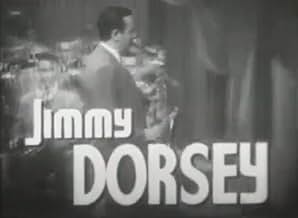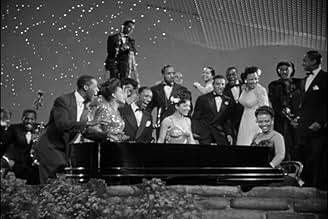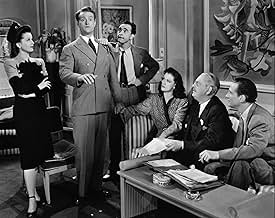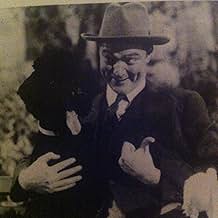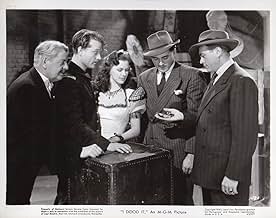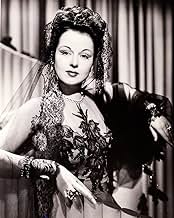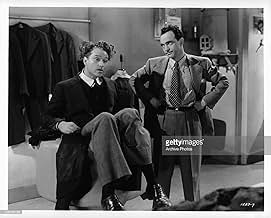Füge eine Handlung in deiner Sprache hinzuA bumbling pants presser at an upscale hotel's valet service nurses an unrequited crush on a Broadway star. He gets more than he bargained for when she agrees to marry him, to spite her woma... Alles lesenA bumbling pants presser at an upscale hotel's valet service nurses an unrequited crush on a Broadway star. He gets more than he bargained for when she agrees to marry him, to spite her womanizing fiance, and encounters Nazi saboteurs.A bumbling pants presser at an upscale hotel's valet service nurses an unrequited crush on a Broadway star. He gets more than he bargained for when she agrees to marry him, to spite her womanizing fiance, and encounters Nazi saboteurs.
- Regie
- Drehbuch
- Hauptbesetzung
Empfohlene Bewertungen
So I've been watching lots of 30s movies, not because they are good or particularly enjoyable. But because you can see the genotype of today's movies, which is to say I can see the origins of how we all dream and mostly imagine.
Now here is an anomaly, a 30s movie made in the 40s. I can only imagine that it was to feed the war-starved theaters. It is a remake and "borrows" musical numbers from a couple films that really were made in the 30s.
It is a spliced picture, three movies combined, something that was common in the 30's.
One movie is a stage show. Simple and straightforward. Lots of variety here.
A second movie is a comedic fold: a movie where all the players are involved in some way in a play (different than the earlier mentioned performances and more like "Gone with the Wind"). Lots of physical humor here. Red Skelton's technique was to perform a comedic motion (like rolling his eyes after getting bonked) in an exaggerated fashion and then abruptly stop before it finished and look at the audience with a big grin. It was humor about humor, a not very sophisticated but an effective fold that would grow into what we have today (and call irony).
The third movie has a wartime saboteur. Because the "fold," the notion of the play within the play, is explicit here, the explosion is to blow up the theater (and somehow simultaneously threaten the nation by mechanisms unexplained).
Its a mess, these three parts not integrated in any way.
Ted's Evaluation -- 1 of 3: You can find something better to do with this part of your life.
For comic timing, nothing beats the scene where Powell takes the sleep medicine by mistake and Skelton is unable to wake her up to either put her in a chair or on a bed. Her limber body provides a lot of chuckles as he struggles to get her off the floor. The timing by both is impeccable and it's one of the film's best routines.
Too bad her dance numbers aren't staged as well as that sequence which runs a little too long. They're serviceable, but that's about all.
Jimmy Dorsey and his orchestra play some nice tunes, best of which is "Star Eyes" sung by Bob Eberly and Helen O'Connell. An "audition" scene featuring Hazel Scott at the piano and Lena Horne as vocalist on "Jericho" is a lively routine that gives the film a much needed musical highlight.
But for both Skelton and Powell, this is one of their lesser efforts. Sam Levene, Thurston Hall, John Hodiak and Richard Ainley offer good support.
Wusstest du schon
- WissenswertesEleanor Powell reportedly knocked herself out cold during rehearsals for the lariat dance.
- Zitate
Kenneth Lawlor: How's the piano, Hazel?
[Hazel runs her fingers up and down the keyboard]
Hazel Scott: I guess it'll hold up.
- Alternative VersionenThere is an Italian edition of this film on DVD, distributed by DNA srl, "THE BAND WAGON (Spettacolo di varietà, 1953) - New Widescreen Edition + IL SIGNORE IN MARSINA (1943) (Shortened Version)" (2 Films on a single DVD, with "The Band Wagon" in double version 1.33:1 and 1.78:1), re-edited with the contribution of film historian Riccardo Cusin. This version is also available for streaming on some platforms.
- VerbindungenEdited from Zum Tanzen geboren (1936)
- SoundtracksStar Eyes
(1943)
Lyrics by Don Raye
Music by Gene de Paul
Played Jimmy Dorsey and His Orchestra (uncredited) at a nightclub
Sung by Bob Eberly (uncredited) and Helen O'Connell (uncredited)
Danced by Red Skelton (uncredited) and Eleanor Powell (uncredited)
Played as background music often
Top-Auswahl
- How long is I Dood It?Powered by Alexa
Details
- Erscheinungsdatum
- Herkunftsland
- Sprache
- Auch bekannt als
- Marido por accidente
- Drehorte
- Produktionsfirma
- Weitere beteiligte Unternehmen bei IMDbPro anzeigen
- Laufzeit
- 1 Std. 42 Min.(102 min)
- Farbe
- Seitenverhältnis
- 1.37 : 1


